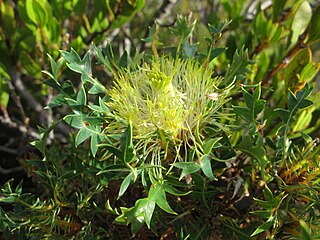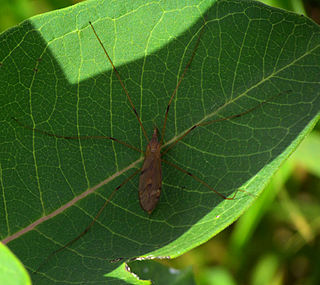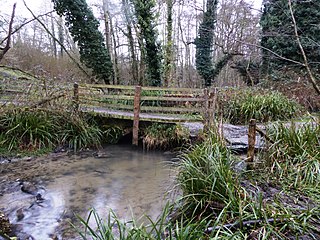
Banksia armata, commonly known as prickly dryandra, is a species of often sprawling shrub that is endemic to Western Australia. It has deeply serrated leaves with sharply pointed lobes and spikes of about 45 to 70 yellow flowers.

Banksia armata var. armata is a variety of shrub that is endemic to Western Australia. It differs from the other variety in having a lignotuber, narrower leaves with more sides lobes and shorter flowers. It is also usually a shorter plant.

Banksia armata var. ignicida is a variety of shrub that is endemic to Western Australia. It differs from the autonym in not having a lignotuber. It is also usually a taller plant with leaves that are longer with fewer side lobes, and longer flowers.

Dryandra ser. Armatae is an obsolete series within the former genus Dryandra. It was first published by George Bentham in 1870, and was given a new circumscription by Alex George in 1996, but was ultimately discarded in 2007 when Austin Mast and Kevin Thiele sunk Dryandra into Banksia.

The "Armata" Universal Combat Platform is a Russian advanced next generation modular heavy military tracked vehicle platform. The Armata platform is the basis of the T-14, the T-15, a combat engineering vehicle, an armoured recovery vehicle, a heavy armoured personnel carrier, a tank support combat vehicle and several types of self-propelled artillery, including the 2S35 Koalitsiya-SV under the same codename based on the same chassis. It is also intended to serve as the basis for artillery, air defense, and NBC defense systems. The new "Armata" tank platform is meant to replace the older Russian MBTs and APCs that are currently used by the Russian military.

The T-14Armata is a next-generation Russian main battle tank based on the Armata Universal Combat Platform—the first series-produced next-generation tank. The Russian Army initially planned to acquire 2,300 T-14s between 2015 and 2020. Production and fiscal shortfalls delayed this to 2025, and then to the cancellation of the main production run. The test batch of 100 is to be delivered and deployed to the 2nd Guards Tamanskaya Motor Rifle Division, with delivery expected to begin in 2021; tanks will be transferred only after the completion of all state tests.

Eriopterini is a tribe of limoniid crane flies in the family Limoniidae. There are more than 20 genera and 3,800 described species in Eriopterini.

Seabrook Stream is a 24.1-hectare (60-acre) biological Site of Special Scientific Interest Kent.
Erioptera distincta is a species of limoniid crane fly in the family Limoniidae.
Saldoida is a genus of shore bugs in the family Saldidae. There are about five described species in Saldoida.
Fota armata is a species of moth in the family Noctuidae. It is found in North America.
Erioptera parva is a species of limoniid crane fly in the family Limoniidae.
Erioptera caliptera is a species of limoniid crane fly in the family Limoniidae.
Erioptera venusta is a species of limoniid crane fly in the family Limoniidae.

Oplonaeschna armata, the riffle darner, is a species of darner in the dragonfly family Aeshnidae. It is found in Central America and North America.
Oplonaeschna is a genus of riffle darners in the dragonfly family Aeshnidae. There are about five described species in Oplonaeschna.
Pronotacantha is a genus of stilt bugs in the family Berytidae. There are about seven described species in Pronotacantha.
Erioptera chlorophylla is a species of limoniid crane fly in the family Limoniidae.
Erioptera septemtrionis is a species of limoniid crane fly in the family Limoniidae.
Erioptera needhami is a species of limoniid crane fly in the family Limoniidae.







